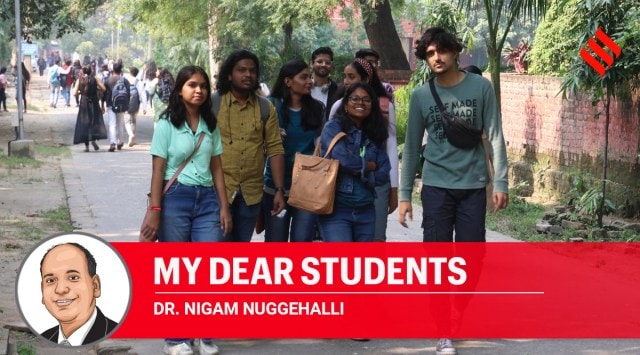The Humanities are not ‘dying’, but are taking new forms
"Students are showing interest in film studies, journalism and music. These may not be traditional humanities subjects but they embody the values that humanities strive for: creativity, imagination, articulation and individuality," writes Nigam Nuggehalli.
 Humanities may be dead as humanities but might be rebirthing in other forms. (Graphics by Angshuman Maity)
Humanities may be dead as humanities but might be rebirthing in other forms. (Graphics by Angshuman Maity) (My dear students’, a fortnightly column that is a conversation with young minds on current events, books, popular culture — just about anything that’s worth talking over a cup of coffee.)
My dear students,
 Are the humanities dead? Anecdotal evidence suggests that STEM is king and anything to do with the social and cultural aspects of human affairs are mere hobby horses. I don’t see too many young people in my circles asking me about studying humanities in college. Sometimes, a young person asks me about a career in the law. Law’s relation to humanities is that of a rich cousin to his poor relatives; not quite a part of the family and yet considered a part of it. But my responses on careers in the law tend to disappoint young people. I am a tax lawyer and yet I talk to them about the wider and more fundamental aspects of the law, things like due process and human rights. They are usually puzzled by my response. They ask me about salaries. The conversation usually ends at that point.
Are the humanities dead? Anecdotal evidence suggests that STEM is king and anything to do with the social and cultural aspects of human affairs are mere hobby horses. I don’t see too many young people in my circles asking me about studying humanities in college. Sometimes, a young person asks me about a career in the law. Law’s relation to humanities is that of a rich cousin to his poor relatives; not quite a part of the family and yet considered a part of it. But my responses on careers in the law tend to disappoint young people. I am a tax lawyer and yet I talk to them about the wider and more fundamental aspects of the law, things like due process and human rights. They are usually puzzled by my response. They ask me about salaries. The conversation usually ends at that point.
Last week, the NewYorker published an article titled ‘The End of the English Major’, that discussed dramatically lower enrollment rates in the humanities in US Universities. The number of English graduates at Arizona State University fell by half over the last ten years. Even places like Harvard have not been spared this trend. The writer notes that Harvard graduates would be employable even if they do a degree in somersaults. Yet, they don’t because their parents tell them that they are not meant to study ‘basket weaving’ at Harvard. They are meant to study STEM courses which will guarantee stable employment in the future. At some level, I am happy that American parents and Indian parents are similar.
The NewYorker article makes a good point about courses deriving their fashionability from the the fact that universities create an atmosphere that favours STEM. A student is quoted as stating “I think that the presence of big tech and consulting firms on campus is a big part of people’s perception that you can’t get a job in the humanities.” I suppose one can’t really blame the universities for jumping on the latest shiny money-making headline-grabbing portfolios. Humanities will have to fend for themselves.
Here’s another take on this issue. Humanities may be dead as humanities but might be rebirthing in other forms. Students are showing interest in film studies, journalism and music. These may not be traditional humanities subjects but they embody the values that humanities strive for: creativity, imagination, articulation and individuality. For example, I think film criticism is an excellent gateway into politics, history, language, sociology and economics, besides more philosophical issues about narrative and form.
Humanities will also become important in a technology driven world because technology will need to be publicly regulated. Notice that as soon as Microsoft released their latest version of an AI enhanced Bing search engine, a blog post by one of their senior employees was posted, titled ‘Meeting the AI moment: advancing the future through responsible AI’. This blog post spent as much time talking about ethical responsibility as much as it talked about AI technology. Seven years earlier, in an article in Slate titled ‘The Partnership of the Future’, Microsoft CEO Satya Nadella talked about AI and responsibility. Check out the web page of the Google driven DeepMind project. Responsible AI figures prominently there too. If AI transforms everything, then we need new rules for a new society. What does fairness mean for an algorithm driven process? How does one ascribe responsibility to AI decisions? What is the relationship between technology and privacy? We will require a big tent interdisciplinary approach, and people with humanities skills will flourish in such eco-systems.
But what are these skills exactly? An ability to be creative, and imaginative. A talent for communicating effectively to different audiences. Possessing advanced inter-personal skills. The humanities are much better placed to impart these skills compared to the hard sciences. Perhaps an appropriate response to the question ‘Is the humanities dead’ is probably that the question is a bit hyperbolic. The traditional humanities might be out of fashion for now , but will take forms and shapes that will make the domain relevant to a new generation. In any case, a stable career is no longer a priority for this generation. Young people want to explore novel but risky opportunities right from the time they graduate from university and for these people, the humanities are the crutch they need to navigate the digitised world.































